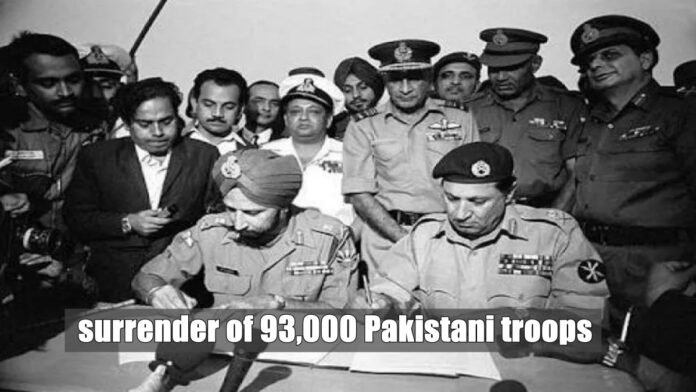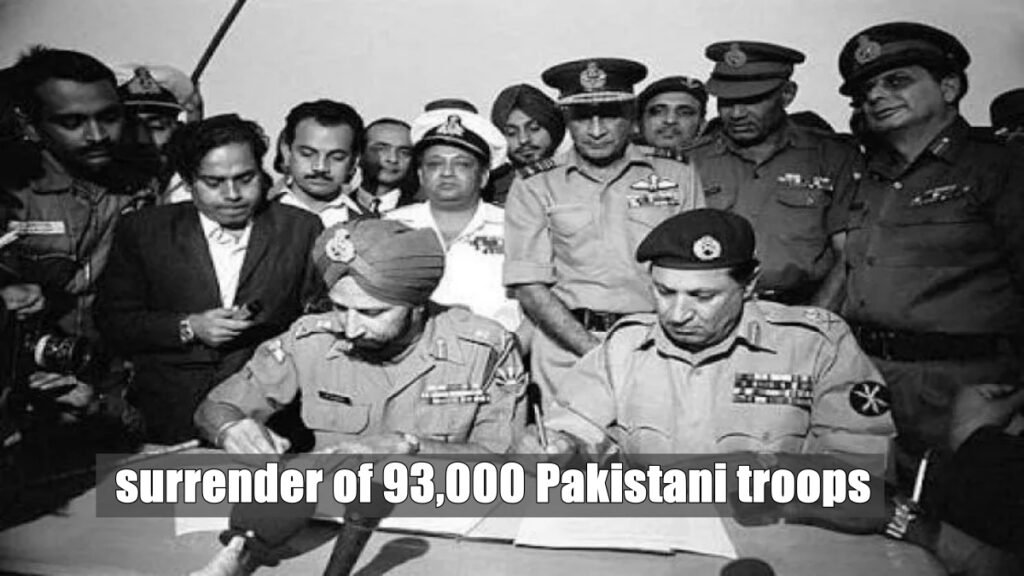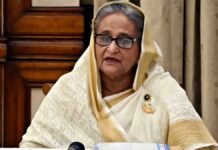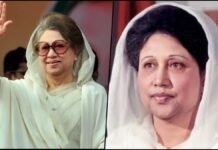
New Delhi: The 1971 war between India and Pakistan was a historic event that led to the birth of a new nation, Bangladesh, and marked a decisive victory for India. The war was triggered by the oppression of the Bengali people in East Pakistan by the Pakistani military, and the subsequent intervention of India to support their liberation struggle. The war lasted for 13 days, from December 3 to December 16, and resulted in the surrender of 93,000 Pakistani troops, the largest in history.
The background of the war
The seeds of the war were sown in the 1970 general elections in Pakistan, which were the first to be held based on universal adult franchise. The Awami League, led by Sheikh Mujibur Rahman, won a landslide victory in East Pakistan, securing 167 out of 169 seats. The party also emerged as the single largest party in the national parliament, with 160 out of 313 seats. However, the Pakistan People’s Party (PPP), led by Zulfikar Ali Bhutto, won a majority in West Pakistan, with 81 seats. Bhutto refused to accept the results and demanded a power-sharing arrangement with Mujib. He also threatened to boycott the assembly session if Mujib was invited to form the government.
Mujib, on the other hand, demanded full autonomy for East Pakistan, based on his six-point program, which included fiscal, political, and cultural rights for the Bengalis. He also called for a constitutional amendment to make Bengali one of the official languages of Pakistan, along with Urdu. He rejected any compromise with Bhutto and insisted on forming the government.
The deadlock between the two leaders led to a political crisis, which was exploited by the military dictator of Pakistan, General Yahya Khan, who imposed martial law and postponed the assembly session indefinitely. He also launched a brutal crackdown on the Bengali population, especially the Awami League supporters, intellectuals, students, and journalists. The Pakistani army, aided by local collaborators, known as Razakars, unleashed a reign of terror, killing, raping, looting, and burning. It is estimated that about three million people were killed and 10 million were displaced in what is known as the genocide of 1971.
The role of India
The atrocities committed by the Pakistani army in East Pakistan sparked a massive exodus of refugees into India, especially in the states of West Bengal, Assam, Tripura, and Meghalaya. India had to bear the burden of hosting and providing relief to about 10 million refugees, which strained its economy and resources. India also faced international pressure to resolve the crisis peacefully and diplomatically, but received little support from the major powers, such as the US, China, and the Soviet Union.
India, under the leadership of Prime Minister Indira Gandhi, decided to support the Bengali freedom fighters, known as the Mukti Bahini, who had formed a provisional government in exile, headed by Tajuddin Ahmad. India provided them with training, arms, ammunition, and sanctuary. India also launched a diplomatic offensive to garner international support for the Bengali cause and signed a treaty of friendship and cooperation with the Soviet Union, which assured India of its veto power in the UN Security Council.
India also tried to persuade Pakistan to stop the violence and accept the democratic verdict of the people, but Pakistan remained adamant and hostile. Pakistan accused India of interfering in its internal affairs and fomenting secessionism in East Pakistan. Pakistan also tried to provoke India by violating its airspace and border. On December 3, 1971, Pakistan launched a pre-emptive strike on several Indian airfields, hoping to cripple India’s air force. However, the attack failed to achieve its objective, and instead, triggered a full-scale war between the two countries.
The course of the war
The war of 1971 was fought on two fronts: the eastern front and the western front. On the eastern front, the Indian army, led by Lieutenant General Jagjit Singh Aurora, and the Mukti Bahini, launched a swift and coordinated offensive against the Pakistani forces, who were outnumbered and isolated. The Indian army captured several strategic points, such as Jessore, Comilla, Chittagong, Sylhet, and Khulna, and advanced towards Dhaka, the capital of East Pakistan. The Indian navy, led by Vice Admiral Nilakanta Krishnan, blockaded the Bay of Bengal and the ports of East Pakistan, cutting off their supply lines and communication. The Indian air force, led by Air Chief Marshal Pratap Chandra Lal, dominated the skies and bombed the Pakistani installations and infrastructure.
On the western front, the Indian army, led by Lieutenant General Premindra Singh Bhagat, and the Indian air force, led by Air Marshal Om Prakash Mehra, defended the Indian territory from the Pakistani attacks and also launched counter-offensives in some sectors, such as Rajasthan, Punjab, and Jammu and Kashmir. The Indian navy, led by Admiral Sardarilal Mathradas Nanda, carried out a daring operation, known as Operation Trident, on the night of December 4-5, in which it attacked and destroyed the Pakistani naval base and oil depot at Karachi, inflicting heavy losses and reducing its naval capability.
The war ended on December 16, 1971, when the Pakistani army, led by Lieutenant General A.A.K. Niazi, surrendered to the Indian army, led by Lieutenant General Jagjit Singh Aurora, at the Ramna Race Course in Dhaka, in front of a jubilant crowd of Bengalis. The surrender ceremony was witnessed by the representatives of the Mukti Bahini and the international media. The instrument of surrender, signed by Niazi and Aurora, stated that the Pakistani forces would lay down their arms and become prisoners of war and that the Indian forces would ensure their safety and security. The surrender of 93,000 Pakistani troops was the largest in history and marked a humiliating defeat for Pakistan.
The outcome of the war
The war of 1971 had far-reaching consequences for both India and Pakistan and for the region as a whole. The most significant outcome of the war was the emergence of Bangladesh as a sovereign and independent nation, with Sheikh Mujibur Rahman as its first president. Bangladesh was formally recognized by India and other countries on December 6, 1971, and was admitted to the UN on September 17, 1974. Bangladesh has since developed as a democratic and secular state, with a vibrant culture and economy, and has maintained friendly relations with India.
The war also enhanced India’s prestige and stature in the world, as it demonstrated its military and diplomatic prowess, and its commitment to uphold the principles of democracy and human rights. India was hailed as a liberator and a peace-maker by the Bengalis and the international community. India also gained strategic advantages, such as the capture of some Pakistani territory, the weakening of its adversary, and the creation of a friendly neighbor.
The war, however, also had some negative repercussions for India, such as the loss of lives and resources, the influx of refugees, the strain on its economy, and the hostility of some countries, especially the US and China, who supported Pakistan. India also faced the challenge of rehabilitating and repatriating the Pakistani prisoners of war and resolving the outstanding issues with Pakistan, such as the Line of Control in Kashmir, the sharing of river waters, and the normalization of relations.
The war was a devastating blow for Pakistan, as it lost half of its population and territory, and suffered a crushing defeat and humiliation. The war exposed the flaws and failures of its political and military leadership, and the fragility of its national unity and identity. The war also triggered a political and social upheaval in Pakistan, leading to the overthrow of General Yahya Khan by Zulfikar Ali Bhutto, who became the president and later the prime minister of Pakistan. Bhutto tried to rebuild Pakistan’s economy and military and also initiated a nuclear program, which led to a nuclear arms race with India. Pakistan also faced the challenge of accepting and recognizing Bangladesh and dealing with the grievances and aspirations of its remaining provinces, especially Balochistan and Sindh.

The war of 1971 was a watershed moment in the history of South Asia, as it reshaped the political and geographical landscape of the region, and altered the balance of power and the dynamics of relations among the countries. The war also left a lasting legacy of courage and sacrifice, triumph and tragedy, and hope and despair, for the people of India, Pakistan, and Bangladesh.



















































